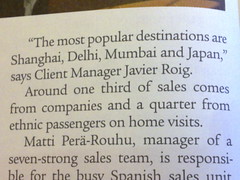Roman Catholic masses were cancelled throughout the city, museums were closed and football matches were played behind close doors (my team, Chivas, tied) to avoid the creation of crowds. People have been generally very calm from what I understand, stayed home and there is no panic shopping, but the streets are rather empty for a city of over 20 million people (some pictures here). If you understand Spanish, a great chronicle of the past two days can be found here and here. The city is not afraid, and people still make fun of the situation from time to time.
Video rentals and video stores were doing brisk business yesterday, and schools are closed until May 6th (May 1st and 5th are holidays anyway). Military personnel have been handling masks around the city and now everybody is bracing themselves for tomorrow: will people go to work or will they home office (those who can)?
The Finnish media have complained about the slow Mexican response to the outbreak, but they seem to ignore that even the National University (UNAM) doesn’t have the equipment needed to distinguish this new virus from its old, previously known cousins and with the normal flu season just ending, there was no cause for concern. On the other hand the World Health Organisation has praised the Mexican response.
There are confirmed cases in Mexico, the US, Canada and New Zealand, and suspected cases in France, Spain, UK & Israel (map here). Deaths have only happened in Mexico, and even there two thirds of the 1200 cases have already been released from hospital. According to some information in the Mexican media, vaccines don’t work, but antivirals such as Tamiflu do. Airports haven’t been closed, but there is more stringent screening in Singapore, Hong Kong and Japan from passengers coming over from North America.
There are two different hypothesis of the origin of the virus: one points to it having started in a farm in Texas and then crossed over to the border, the other one points to farms in Perote, Veracruz, Mexico. None has been confirmed.
If you want to know more in real time, you can follow @Veratect and @zolliker (in Spanish) on Twitter.




